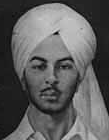| Bhagat Singh (1907 - 1931) |
|
Bhagat Singh was born in a Sikh family of farmers in the village of Banga of Layalpur district of Punjab (now in Pakistan) on September 27th of 1907. His family stood for patriotism, reform, and freedom of the country. His grandfather Arjun Singh was drawn to Arya Samaj, a reformist movement of Hinduism, and took keen interest in proceedings of the Indian National Congress. Bhagat Singh's father Kishen Singh and uncle Ajit Singh were members of Gadar Party founded in the U.S. in early years of the 20th century to route British rule in India. Both were jailed for alleged anti-British activities.
|
 |
Young Bhagat Singh was brought up in a politically charged state of Punjab which was left with a seething memory of the Jalianwala Bagh massacre of more than 400 innocent lives and thousands injured (1919). As a lad of fourteen he went to this spot to collect soil from the park of Jalianwala (bagh) in his lunch box, sanctified by the blood of the innocent and kept it as a memento for life.
Bhagat Singh was studying at the National College founded by Lala Lajpat Rai, a great revolutionary leader and reformist. To avoid early marriage, he ran away from home and, became a member of the youth organization Noujawan Bharat Sabha which had memberships of all sects and religions. He met Chandra Shekhar Sharma (Azaad), B.K. Dutt and other revolutionaries. They used to print handouts and newspapers in secret and spread political awareness in India through Urdu, Punjabi and English. These were all banned activities in India at the time, punishable with imprisonment.
In Lahore, Lala Lajpat Rai and Pandit Madan Mohan Malaviya decided to protest to the commission in open about their displeasure. It was a silent protest march, yet the police chief Mr. Scott had banned meetings or processions. Thousands joined, without giving room for any untoward incident. Even then, Mr. Scott beat Mr. Lala Lajpat Rai severely with a lathi (bamboo stick) on the head several times. Finally the leader succumbed to the injuries.
Bhagat Singh who was an eye witness to the morbid scene vowed to take revenge and with the help of Azaad, Rajguru and Sukhdev plotted to kill Scott. Unfortunately he killed Mr. Sanders, a junior officer, in a case of mistaken identity. He had to flee from Lahore to escape death punishment.
Instead of finding the root cause for discontent of Indians, the British government took to more repressive measures. Under the Defense of India Act, it gave more power to the police to arrest persons to stop processions with suspicious movements and actions. The act brought in the council was defeated by one vote. Even then it was to be passed in the form of an ordinance in the "interest of the public." No doubt the British were keen to arrest all leaders who opposed its arbitrary actions, and Bhagat Singh who was in hiding all this while, volunteered to throw a bomb in the central assembly where the meeting to pass the ordinance was being held. It was a carefully laid out plot, not to cause death or injury but to draw the attention of the government, that the modes of its suppression could no more be tolerated. It was agreed that Bhagat Singh and Batukeshwar Dutt would court arrest after throwing the bomb.
It was a forgone conclusion in 1929 April 8th at Delhi Central Assembly. Singh and Dutt threw handouts, and bombed in the corridor not to cause injury and courted arrest after shouting slogans Inquilab Zindabad (Long Live, Revolution!)
Meanwhile the killers of Sanders were identified by the treachery of Bhagat Singh's friends who became "Approvers." Bhagat Singh thought the court would be a proper venue to get publicity for the cause of freedom, and did not want to disown the crime. But he gave a fiery statement giving reasons for killing which was symbolic of freedom struggle. He wanted to be shot like a soldier, and not die at the gallows. But, his plea was rejected, and he was hanged on the 23rd of March 1931. He was 24.
Bhagat Singh became a legendary hero for the masses. Innumerable songs were composed about him, and the youth throughout the country made him their idol. He became a symbol of bravery and of the struggle to free India.
|
|
| |
| Category filed under: Political |
|
|